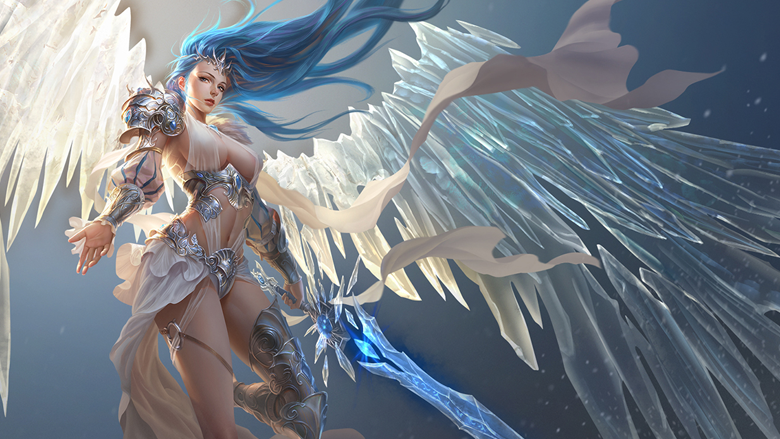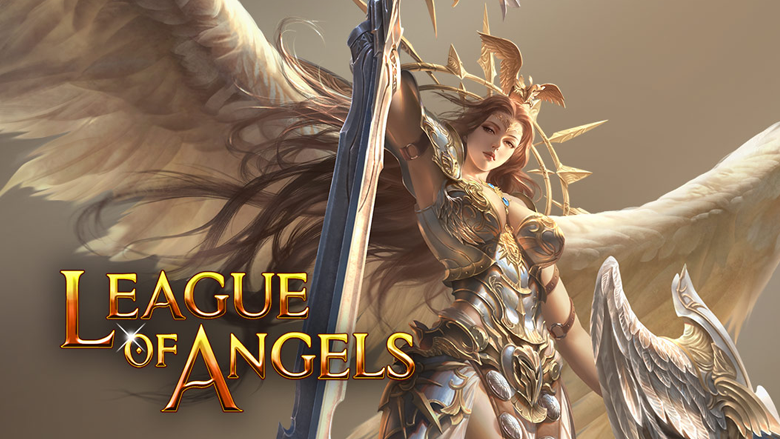Ilya Salamatov, Director of Business Development at 101XP, is going to tell us about partnership relations with Chinese companies, publishing of the games and localization.

Image Credit: League of Angels
Hi! Could you please tell us few words about the company?
Hi! Our company celebrates its 6th birthday this year. Exactly 6 or 7 years ago everyone started to realize that offline retail market was decreasing and everyone went online. When local social networks allowed publishing applications, a new promising and dynamic market appeared. In 2009, Alex Ruzhentsev, who had experience of launching such titles as The Witcher, Call of Duty 4, Tomb Raider, Hitman and many others, decided to open his own company.

Ilya Salamatov
101XP took its first steps in social networks, then it launched a gaming platform, where games from China, Korea, and Europe were launched. They were translated into Russian, English and Polish languages with the full 24/7 user support in these languages. Also, 101XP games were presented in all major social networks: VK, OK, FB. Now we have more than 30 games with 6M players monthly. Currently, we launch one game every two weeks on our gaming platform.
How do you work with Eastern companies? For example, when you like a game, do you go straight to the Chinese developer and say that you want to publish it? Or is there some other way?
It’s not that simple. All the fun starts from the moment when you like the game and you want to contact the developer. First of all, it’s quite hard to find who is the developer of the game. It’s not a joke. Sometimes there is no information at all.
It is necessary to understand the mentality of the Chinese people. I remember a friend of mine was buying construction materials from the dentist. He made a mistake dialing a number, asked for materials, and the dentist decided not to miss the opportunity to earn some money. They discussed type, value, amount and even the wallpaper pattern. By the time my friend realized that it was not his supplier, he had an appointment made.
It works the same way with games. You connect with a publisher hoping to find a developer of a wonderful game for girls, some glamor dancing simulator, in which you can dance, meet people, build a house, have fun with friends at the spa and shopping. And the publisher, which you try to contact, recently published a game about Killer Robots. Or no game at all, but he will never tell you about it. Even if the company produces smartphones instead of publishing games, they won’t miss the opportunity to earn some money. They just have to try at least. And it’s not even cheating, at least they will be looking for your game. And as a result, they may offer you Killer Robots online. They won’t be surprised or disappointed when you fiercely decline their offer. The Chinese will take it as another strategic step towards his financial well-being.

They say “when a door closes a window opens”. So you don’t buy Killer Robots and polka dot wallpapers, no problem, the next guy does. Chinese mentality reflects their spiritual and traditional values, which have been developing for thousands of years. The Chinese won’t even be angry, while you’re in rage, waving your hands and calculating the total amount of expenses for the last 3 months of receiving their emails with promises and traveling back and forth, ordering Beijing Duck in the best places of Beijing. As you can see, you need to know every detail of the Chinese market, to understand its structure and have reliable people on the other side who can connect you with some possible partners you are looking for. We have spent several years and countless trips building our base of contacts, but the key point is still personal relationships.
How do you decide if the game suits you?
We analyze a large number of features: gameplay, monetization, graphics and the style of the game. Now it is important for us to choose the game that will attract not only Russian but also Western users because our platform is already launched in three languages: Russian, English, and Polish.
It is clear that the Russian and the Chinese audiences are two completely different things, how do you figure out what can suit our players in Chinese or Korean games?
Well, here you should use market knowledge and logic. For example, eastern games are characterized by aggressive monetization. In South Korea and China, players are used to it, they feel comfortable being bombarded by tons of special offers and sales 5 minutes after they logged in. You can level up very quickly because of the pay-to-win monetization option. It is clear that Russian and Western users won’t like it. So there are two ways: either changing the game or abandoning it. Well, in general, the situation isn’t so terrible, our players love many Asian titles like Demon Slayer or legendary Linage 2.
What other fundamental differences of these markets have you noticed?
We have already begun to discuss the differences between audiences, but there is more. Eastern players are more persistent and patient. If a Chinese player starts playing, he is likely to finish the game. Also, he is less spoiled. It is no secret that the game start has to be as simple as possible for Western players.
The Chinese can wait patiently until the screen is loaded and “play” button appears as they started using the Internet much later than the Western users. And this feature of them is great. Also they love their history and the games about it. It is unlikely to launch a successful browser game based on Russian folklore here. But it’s incredibly popular in China as there are hundreds of projects about myths or real events of ancient China .
What do you usually remove or add when you publish a game?
So much time is spent on negotiation with our Chinese partners, we discuss lowering the barrier to entry and extending the number of items in the store. Also, we face some problems localizing interface and game icons. For example, the icon indicating the inventory is one symbol. We need to manage putting 9 letters there: INVENTORY. The best option is to depict a bag and make a menu with symbols, which is easier to translate later, but there is no universal method, each game is unique. Sometimes you need to change the visual part. Players love to personify themselves with their characters, so in some games we change the images, giving the characters European features. Oh, and texts localization, the game should not be just translated, it is necessary to be adapted: we replace all the references to the Chinese history, movies, and folklore, with the Russian or English ones.
It is also often necessary for the product to be licensed so that no IP-issues appear after the launch.
So you find a game that you like, build nice relationships with the representatives of the Chinese company (drink vodka?). Then what?
At this point, the Chinese, the Koreans, and the Japanese do not differ much from the Russians. And vodka (or strong Chinese wine) is a must. However, vodka can contain a preserved snake and a snack will be dried crickets or scorpions, but everything is for the best.
When all the agreements are reached, all vodka is drunk, and all snakes are eaten, lawyers come out. Signing a contract with a Chinese partner is some kind of an art. Many Western businessmen are complaining that the Chinese side can not be trusted.
But then again, you need to understand the mentality. The Chinese have their own code of honor, through which they will never step over. For example, if you make a mistake, a typo in the contract with the German partner, he is likely to point it out to your, boiling over your carelessness.
If you have a typo in the contract with the Chinese partner, no one will tell you. You got something wrong or your assistant added extra zeros to some numbers. They will sign and then will force you to follow the agreement. No surprises here. There are more than a billion people there, as they say, you snooze, you lose.
But when the contract is signed, the Chinese will fulfill its every point as the covenants of Mao Tse-Tung. And you can calmly work on localization and the adapting the game for the Western market.
How do you prepare Russian audience for a project?
I can’t tell all the secrets of our work. But in short, we work in several directions. Localization starts right after signing the contract. A game gets a translation, new builds get tested, compilated and tested again. Marketing department fills out a marketing passport, searches promotion channels, makes a detailed PR plan. Basing on these materials community managers and copywriters prepare various texts: descriptions of the game, guides, news, and events. Designers prepare arts and other visual materials. All content depends on the platform. Various contests start before the launch where people can win different promo-codes and so on. A week before the release we post images and screenshots of different characters with descriptions of their tempers, abilities and more. Everything that can be done for localization so that the game suits Russian and Western market perfectly is implemented to the maximum.
I can’t help but ask about the money. On the average, how much is spent on bringing a game to the Russian market and its support?
It depends on the project, the platform, the type of the game and its performance in the developer’s country. Licensing, localization, and launching of downloadable games is expensive, while the support of it is cheap. In the case of a browser game ratio is mirrored, about 40% of the publishing budget is spent on the launch and preparations and 60% on its support.
Now we are talking about arithmetical average, which not really a showcase as we don’t have average games. Each game is unique. It’s necessary to consider many factors separately: the cost of the license, the number of servers, the amount of test for localization.
How quickly it pays off?
Each project pays off differently. Browser games depend on the number of players. Some games may not pay off at all. You can win with the first, the second and the third project, and then lose a lot with the fourth. Choosing a game and localizing it is always a story about intuition, experience, and a little luck. Each biz dev manager has to be lucky.
And the last question. How many people are involved in each project and what do they do?
Each stage requires different people. In short, the game takes from 5 to 30 people, depending on the size of the project.
Business development managers are responsible for search, analysis, and docs. After signing the agreement a game goes to producers. Integration starts, a manager of the release department contacts the development team and asks for a lockit.
While the game is being translated, the hardware and the operating system on which the game will run is getting assembled. Once the payment and the analytical part are ready, the game moves from the release department to the operating one. The game gets a manager, and everything that happens to the game is his responsibility.
A very important part of the work of the operating manager is constantly communicating with the developer: analytics, updates, possible improvements. We are a publisher, we don’t just make money – we are supporting the developers. We bring the developers on various platforms and markets where they have no access due to the language, cultural and other barriers.
A community manager, a user support manager and a team of moderators are assigned to a game after the release. Usually, one moderator for each gaming server is selected by a community manager. If we add designers to it, then perhaps the whole company of 101 people is working on a project.
